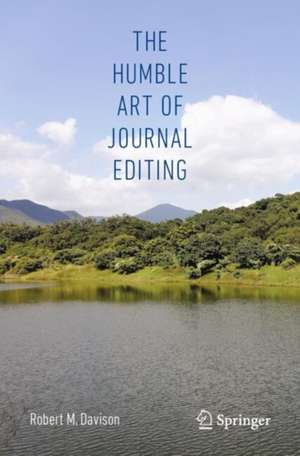The Humble Art of Journal Editing
Autor Robert M. Davisonen Limba Engleză Paperback – mai 2024
The book begins with an introduction to the art of scholarly journal editing,the nature of that art (Chapter 1), and an examination of editorial promulgation of cultural values of scholarly journals with an emphasis on responsible research (Chapter 2). Chapter 3 examines the many issues associated with sourcing content, and opines on the novelty, breadth, and depth of research, including discussions of indigenous theorization, serendipity, iconoclastic research, and the value of special issues. Chapter 4 deals with the review process and offers advice for formulating effective reviewer guidelines that lead to constructive and developmental advice for authors. The next two chapters discuss the audience of the journal as well as publisher relations. Finally, the book is concluded with thoughts and recommendations about emerging challenges, such as the ethics of AI tools (like ChatGPT), predatory journals, and the open-access movement.
Offering a practical guide to editing scholarly journals, this book will be a key resource for scholars making the leap from researcher to editor, regardless of discipline.
Preț: 177.69 lei
Nou
Puncte Express: 267
Preț estimativ în valută:
34.01€ • 36.96$ • 28.59£
34.01€ • 36.96$ • 28.59£
Carte disponibilă
Livrare economică 31 martie-14 aprilie
Preluare comenzi: 021 569.72.76
Specificații
ISBN-13: 9783031523229
ISBN-10: 3031523229
Ilustrații: IX, 140 p. 6 illus.
Dimensiuni: 155 x 235 mm
Greutate: 0.22 kg
Ediția:2024
Editura: Springer Nature Switzerland
Colecția Springer
Locul publicării:Cham, Switzerland
ISBN-10: 3031523229
Ilustrații: IX, 140 p. 6 illus.
Dimensiuni: 155 x 235 mm
Greutate: 0.22 kg
Ediția:2024
Editura: Springer Nature Switzerland
Colecția Springer
Locul publicării:Cham, Switzerland
Cuprins
Motivation.- Cultural values.- Sourcing content.- Reviewing.- The audience.- Dealing with the publisher.- Future challenges.- Conclusions.
Notă biografică
Robert Davison is a Professor of Information Systems at the City University of Hong Kong. His research focuses on the use and misuse of information systems, especially with respect to problem-solving, guanxi formation, and knowledge management, in Chinese organizations. He has published over 90 articles in a variety of journals such as MIS Quarterly, the Information Systems Journal, IT&People, Journal of IT, Journal of the AIS, Journal of the American Society for Information Science & Technology, IEEE Transactions on Engineering Management, Decision Support Systems, Communications of the AIS, and Communications of the ACM. Robert chairs the IFIP WG 9.4 (Social Implications of Computing in Developing Countries) and is the Editor-in-Chief of the Information Systems Journal and the Electronic Journal of Information Systems in Developing Countries. As a researcher and as editor, he seeks to promote both an inclusive and a local perspective to research.
Textul de pe ultima copertă
The publication of scholarly research is both a major driver of social progress and a significant industry in its own right. Scholarly research is the focus of attention for countless numbers of scholars globally and a key measure of scholarly excellence. Much has been written about the conduct of research that is designed to help scholars attain appropriate standards of rigor and relevance, and indeed craft their research outputs in ways appropriate for different venues, notably as journal articles, conference papers, book chapters, and books. However, although scholarly researchers fulfill roles other than as authors, for instance as journal reviewers and editors, there is a dearth of consolidated information about the nature of editorial work. Drawing on over two decades of experience in editing scholarly journals, the author offers a more systematic guide to scholarly journal editing.
The book begins with an introduction to the art of scholarly journal editing, the nature of that art (Chapter 1), and an examination of editorial promulgation of cultural values of scholarly journals with an emphasis on responsible research (Chapter 2). Chapter 3 examines the many issues associated with sourcing content, and opines on the novelty, breadth, and depth of research, including discussions of indigenous theorization, serendipity, iconoclastic research, and the value of special issues. Chapter 4 deals with the review process and offers advice for formulating effective reviewer guidelines that lead to constructive and developmental advice for authors. The next two chapters discuss the audience of the journal as well as publisher relations. Finally, the book is concluded with thoughts and recommendations about emerging challenges, such as the ethics of AI tools (like ChatGPT), predatory journals, and the open-access movement.
Offering a practical guide to editing scholarly journals, this book will be a key resource for scholars making the leap from researcher to editor, regardless of discipline.
The book begins with an introduction to the art of scholarly journal editing, the nature of that art (Chapter 1), and an examination of editorial promulgation of cultural values of scholarly journals with an emphasis on responsible research (Chapter 2). Chapter 3 examines the many issues associated with sourcing content, and opines on the novelty, breadth, and depth of research, including discussions of indigenous theorization, serendipity, iconoclastic research, and the value of special issues. Chapter 4 deals with the review process and offers advice for formulating effective reviewer guidelines that lead to constructive and developmental advice for authors. The next two chapters discuss the audience of the journal as well as publisher relations. Finally, the book is concluded with thoughts and recommendations about emerging challenges, such as the ethics of AI tools (like ChatGPT), predatory journals, and the open-access movement.
Offering a practical guide to editing scholarly journals, this book will be a key resource for scholars making the leap from researcher to editor, regardless of discipline.
Caracteristici
Offers a systematic guide to editing a scholarly journal Establishes best practices for a constructive and developmental review process Addresses challenges such as the ethics of AI tools and predatory journals
